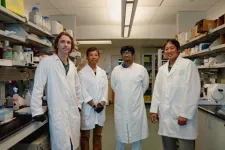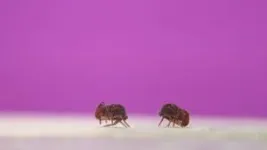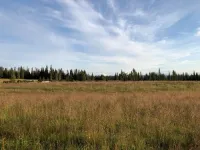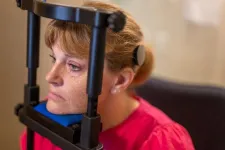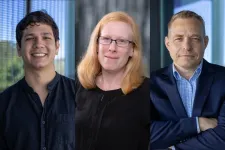(Press-News.org) For decades, scientists have dreamt of a future where genetic diseases, such as the blood clotting disorder hemophilia, could be a thing of the past. Gene therapy, the idea of fixing faulty genes with healthy ones, has held immense promise. But a major hurdle has been finding a safe and efficient way to deliver those genes.
Now, researchers at the University of Hawaiʻi’s John A. Burns School of Medicine (JABSOM) have made a significant breakthrough in gene editing technology that could revolutionize how we treat genetic diseases. Their new method offers a faster, safer, and more efficient way to deliver healthy genes into the body, potentially leading to treatments for hundreds of conditions. This research was recently published in Nucleic Acids Research.
Here’s how it works.
Current methods can fix errors in genes, but they can also cause unintended damage by creating breaks in the DNA. Additionally, they struggle to insert large chunks of genetic material such as whole genes.
The new technique, developed by Dr. Jesse Owens along with his team Dr. Brian Hew, Dr. Ryuei Sato and Sabranth Gupta, from JABSOM's Institute for Biogenesis Research and Cell and Molecular Biology Department, addresses these limitations. They used laboratory evolution to generate a new super-active integrase capable of inserting therapeutic genes into the genome at record-breaking efficiencies.
“It’s like having a "paste" function for the human genome,” said Dr. Owens. “It uses specially engineered ‘integrases’ to carefully insert healthy genes into the exact location needed, without causing breaks in the DNA. This method is much more efficient, with success rates of up to 96% in some cases.”
“This could lead to faster and more affordable treatments for a wide range of diseases, potentially impacting hundreds of conditions with a single faulty gene,” said Dr. Owens.
Faster Development of Treatments and a Broader Range of Applications
The implications of this research extend beyond gene therapy. The ability to efficiently insert large pieces of DNA has applications in other areas of medicine.
When making cell lines to produce therapeutic proteins, the gene encoding the protein is usually randomly inserted into the genome, and it rarely lands in a location in the genome that is good for production. This is like searching for a needle in a haystack. Additionally, finding a cell with the gene inserted correctly and producing the desired protein can take many months.
Instead of searching for a needle in a haystack, Dr. Owens' technique makes a stack of needles. It delivers the gene directly to the desired location, significantly speeding up the development process.
“JABSOM takes pride in nurturing talented researchers like Jesse Owens, whose work has the power to create a global impact,” said Sam Shomaker, dean of the University of Hawaiʻi John A. Burns School of Medicine. “This research, conducted in our lab in the middle of the Pacific, has the potential to significantly improve the way we treat genetic diseases.”
Dr. Owens' team is exploring how this technique could accelerate the development and manufacture of biologics and advanced therapies such as antibodies. Currently, finding the right cell line for efficient production can be a time-consuming process. However, Dr. Owens’ new genome engineering tool can reduce the cell line development timeline and accelerate the manufacture of life-saving therapeutics.
Dr. Owens has founded a 501c3 nonprofit aimed at supporting local research in genetic engineering here in Hawaii, details can be found on the Hawaii Advanced Genetic Medicine Foundation’s website: HawaiiAGMF.org.
END
Gene therapy gets a turbo boost from University of Hawaii researchers
Breakthrough technology could safely, efficiently treat hundreds of genetic diseases
2024-08-29
ELSE PRESS RELEASES FROM THIS DATE:
Global timber supply threatened as climate change pushes cropland northwards
2024-08-29
Climate change will move and reduce the land suitable for growing food and timber, putting the production of these two vital resources into direct competition, a new study has found.
The sight of vineyards in Britain is becoming more common as hotter summers create increasingly suitable conditions for growing grapes. But behind this success story is a sobering one: climate change is shifting the regions of the world suitable for growing crops.
Researchers at the University of Cambridge have uncovered a looming issue: as the ...
Researchers identify basic approaches for how people recognize words
2024-08-29
University of Iowa researchers have defined how people recognize words.
In a new study with people who use cochlear implants to hear, the researchers identified three main approaches that people with or without hearing impairment use to recognize words, an essential building block for understanding spoken language. Which approach depends on the person, regardless of hearing aptitude or ability: Some wait a bit before identifying a word, while others may tussle between two or more words before deciding which word has been heard.
When a person hears a word, the brain briefly considers hundreds, if not thousands, ...
Experts call for routine measurement of lipoprotein (a) levels
2024-08-29
London, UK: Heart experts say that everyone should have their levels of lipoprotein (a) (Lp(a) measured routinely at least once in life, following research from one of the most populous EU countries, Poland, that shows how common high levels of Lp(a) are in the general population.
The findings come from several studies presented at the European Society of Cardiology (ESC) Congress taking place in London, UK, this week [1] and published in two journals: Progress in Cardiovascular Disease and Archives of Medical Sciences [2].
LP(a) is a parcel of fats (also known ...
Land-sea “tag-team” devastated ocean life millions of years ago reveal scientists
2024-08-29
Scientists have revealed how a “tag-team” between the oceans and continents millions of years ago devastated marine life – and altered the course of evolution on Earth.
Their study has unearthed a new explanation for a string of severe environmental crises, called oceanic anoxic events, which happened between 185 and 85 million years ago.
These occurred when the seas became critically depleted of dissolved oxygen.
Experts from the University of Southampton, which led the study, said these events triggered significant biological upheavals, including ...
Researchers map 50,000 of DNA’s mysterious ‘knots’ in the human genome
2024-08-29
Researchers map 50,000 of DNA’s mysterious ‘knots’ in the human genome
Innovative study of DNA’s hidden structures may open up new approaches for treatment and diagnosis of diseases, including cancer.
DNA is well-known for its double helix shape. But the human genome also contains more than 50,000 unusual ‘knot’-like DNA structures called i-motifs, researchers at the Garvan Institute of Medical Research have discovered.
Published today in The EMBO Journal is the first comprehensive map of these unique DNA structures, shedding light on their potential roles in gene regulation involved in disease.
In a landmark 2018 study, Garvan scientists ...
Can fungi turn food waste into the next culinary sensation?
2024-08-29
Chef-turned-chemist Vayu Hill-Maini has a passion: to turn food waste into culinary treats using fungi.
One of his collaborators is Rasmus Munk, head chef and co-owner of the Michelin two-star restaurant Alchemist in Copenhagen, who serves a dessert — orange-colored Neurospora mold grown on rice — inspired by Hill-Maini.
For the past two years, Hill-Maini has worked with a team of chefs at Blue Hill at Stone Barns, a Michelin two-star restaurant in Pocantico Hills, New York, to generate tasty morsels from Neurospora mold grown on grains and pulses, including the pulp left over from making oat ...
Women with endometriosis at greater associated risk of heart attack and stroke
2024-08-29
London, United Kingdom – 29 Aug 2024: According to research presented at ESC Congress 2024,1 women with endometriosis have a 20% greater risk of significant cardiac outcomes compared with women without endometriosis.
“For decades, cardiovascular disease (CVD) has been thought of as a man’s disease and risk factors have been considered from the male perspective, for example, including erectile dysfunction in guidelines on CVD risk assessment.2 Yet, 1 in 3 women die from CVD and 1 in 10 women suffer from ...
Catching up on sleep on weekends may lower heart disease risk by up to 20%
2024-08-29
London, United Kingdom – 29 August 2024: The demands of the working week, often influenced by school or work schedules, can lead to sleep disruption and deprivation. However, new research presented at ESC Congress 2024 shows that people that ‘catch up’ on their sleep by sleeping in at weekends may see their risk of heart disease fall by one-fifth.
“Sufficient compensatory sleep is linked to a lower risk of heart disease,” said study co-author Mr Yanjun Song of the State Key Laboratory ...
Quitting smoking nearly halves heart attack risk, cutting down does little
2024-08-29
London, United Kingdom – 29 August 2024: According to research presented today at ESC Congress 2024,1 patients with stable coronary artery disease who quit smoking at any timepoint after their diagnosis reduced their risk of a major event by almost 50%. In contrast, there was minimal impact on cardiovascular risk in patients who reduced their smoking habits.
The international CLARIFY registry (prospeCtive observational LongitudinAl RegIstry oF patients with stable coronary arterY ...
Children contribute to group projects when there are clear and common goals
2024-08-29
Children can work together to reach a target that benefits a whole group even if it is at a personal cost to themselves, a new study has shown.
Researchers invited groups of six to 10-year-olds to take part in a game where they were each given containers of water and could decide how much of it to offer into a common pool.
If the group contributed a certain amount of water it resulted in benefits for the whole group, but children also obtained benefits for any water they kept.
At the same time, the ...
LAST 30 PRESS RELEASES:
Globe-trotting ancient ‘sea-salamander’ fossils rediscovered from Australia’s dawn of the Age of Dinosaurs
Roadmap for Europe’s biodiversity monitoring system
Novel camel antimicrobial peptides show promise against drug-resistant bacteria
Scientists discover why we know when to stop scratching an itch
A hidden reason inner ear cells die – and what it means for preventing hearing loss
Researchers discover how tuberculosis bacteria use a “stealth” mechanism to evade the immune system
New microscopy technique lets scientists see cells in unprecedented detail and color
Sometimes less is more: Scientists rethink how to pack medicine into tiny delivery capsules
Scientists build low-cost microscope to study living cells in zero gravity
The Biophysical Journal names Denis V. Titov the 2025 Paper of the Year-Early Career Investigator awardee
Scientists show how your body senses cold—and why menthol feels cool
Scientists deliver new molecule for getting DNA into cells
Study reveals insights about brain regions linked to OCD, informing potential treatments
Does ocean saltiness influence El Niño?
2026 Young Investigators: ONR celebrates new talent tackling warfighter challenges
Genetics help explain who gets the ‘telltale tingle’ from music, art and literature
Many Americans misunderstand medical aid in dying laws
Researchers publish landmark infectious disease study in ‘Science’
New NSF award supports innovative role-playing game approach to strengthening research security in academia
Kumar named to ACMA Emerging Leaders Program for 2026
AI language models could transform aquatic environmental risk assessment
New isotope tools reveal hidden pathways reshaping the global nitrogen cycle
Study reveals how antibiotic structure controls removal from water using biochar
Why chronic pain lasts longer in women: Immune cells offer clues
Toxic exposure creates epigenetic disease risk over 20 generations
More time spent on social media linked to steroid use intentions among boys and men
New study suggests a “kick it while it’s down” approach to cancer treatment could improve cure rates
Milken Institute, Ann Theodore Foundation launch new grant to support clinical trial for potential sarcoidosis treatment
New strategies boost effectiveness of CAR-NK therapy against cancer
Study: Adolescent cannabis use linked to doubling risk of psychotic and bipolar disorders
[Press-News.org] Gene therapy gets a turbo boost from University of Hawaii researchersBreakthrough technology could safely, efficiently treat hundreds of genetic diseases
